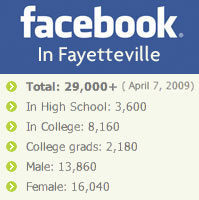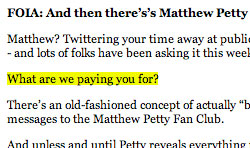Do you remember in the late nineties when cell phones were laughed at? Skeptics used to joke that mobile phones were unnecessary and would only be used for worthless conversations that held no real meaning or value such as:
“I’m on my way to your house.”
“I’m almost there.”
“I’m in your driveway.”
Ten years and 203 million cell phone users later it was evident that for better or worse, cell phones were the preferred communication device.
A lot has changed since then. Whereas it took cellular technology nearly a dozen years to convince critics that it was indeed more than just a fad, the communication tools of today are becoming so popular so quickly that those who criticize them are the ones who look silly.
I’m talking, of course, about social media. With names like Flickr, Facebook and Twitter, it’s easy for those who are late adopters to poke fun of and write off the communication tools of today’s culture as just toys for the shallow-minded.
A recent Arkansas Times blog post sounds eerily familiar. In an attempt to write off one of the most popular social media tools in the world as just an avenue for mundane messages, the post’s author, Richard S. Drake, assumes Twitter users only send out things like:
“I had a great breakfast.”
“I’m going to work now.”
“I’m stuck in traffic.”
Mr. Drake’s not alone, though. Just last week, Comedy Central’s Stephen Colbert had his way with Twitter founder Biz Stone on the Colbert Report and made some of the exact same assumptions. But with things moving so quickly and with so many people jumping on board, instead of coming across as watchdogs, some of those in the media just sound plain out of touch.
That’s because there’s a lot more to what’s going on inside those 140 characters. Businesses are using Twitter to network and reach out to current/potential customers. Politicians are using it to gauge public interest and celebrities are using it to control the media by directly communicating with their fans.
Social media is on the rise and some of the usage statistics might surprise even its most staunch supporters. According to internal research at Facebook.com, there are more than 175 200 million active users on its site and more than half of them are outside of college. Believe it or not, the fastest growing demographic on Facebook is those 35 years old and older.
As for Twitter, Nielsen Online reported in February that membership numbers increased from 475,000 to 7,038,000 in just one year. That’s a 1382% increase in growth.
Why are these tools so popular? Is it because they’re fun? Is it because they’re free? Or is it because they are actually building connections, unleashing social potential and helping existing communities connect with other existing communities?
One local City Council member is less interested in the oohs and ahhs of why social media is growing so fast and more interested in the fact that the City of Fayetteville now has the potential to effectively communicate with thousands of citizens at a time when traditional media subscription numbers are dropping dramatically.

Petty’s local Facebook research.
“There are over 29,000 Fayetteville residents using Facebook right now and of those, 26,000 are old enough to vote. Within a matter of seconds, the City could make an important announcement and potentially reach more citizens than the entire subscription base of both our local newspapers combined. And Facebook announcements don’t cost a dime,” said Ward 2 Alderman Matthew Petty.
With time being the only cost the City would incur from making announcements using social media sites like Facebook or Twitter, Petty believes that supplementing the current practice of using the newspaper to make announcements with social media tools is the best plan.
“We need to acknowledge that different people get their news in different ways and it’s the government’s duty to try and engage everyone. We need to use Facebook, Twitter, and other emerging tools, but we need to keep using the papers, too. People still get their news from the paper, and it would be wrong to ignore them just because Facebook has more subscribers and lets people comment,” said Petty.
But simple acknowledgement isn’t all he’s asking for. In fact, on April 21st, Petty plans to bring forth a resolution requiring that the City of Fayetteville start providing notices, summaries, and links to additional resources via social media tools and to make a good faith effort to include public comment and discussion received from sites like Facebook and Twitter in the record.
Reading over a draft copy of the resolution provided by Petty, there would also be a requirement that the City make known a communications strategy that incorporates all media formats in use by a substantial number of its citizens and that it update the strategy annually, to adapt to changing communication trends and take advantage of new cost-saving opportunities.
“Technology is constantly evolving, and the city needs to stay on top of the latest ways to engage the public,” said Petty.
This resolution will surely be met with hesitation from those who still don’t understand the value in social media. The alderman has already been criticized for using Twitter during public meetings. But those questioning his motives aren’t always telling the full story whether they realize it or not. In a recent editorial, the Northwest Arkansas Times’ editors accused Petty of “keeping in touch with fellow ‘Tweeters'” when he should’ve been paying “full attention to the public business at hand.”
Anyone who was following Petty’s messages, though, knows that the announcements he was sending out were updates on decisions and notices of what issues were coming up next. Maybe it was the following message that got under the newspaper editors’ skins:
At #FayCouncil, we are considering limiting newspaper publishing to only the legally required items. Inroads to social media use?
 As for the Arkansas Times’ blog post mentioned above, Mr. Drake makes a second mistake in assuming that Alderman Petty’s messages during the meeting were somehow not available for the public to see. He even asks the question, “What are we paying you for?” as if Mr. Petty was somehow doing a disservice to his constituents by trying to engage them directly. I couldn’t hold my
As for the Arkansas Times’ blog post mentioned above, Mr. Drake makes a second mistake in assuming that Alderman Petty’s messages during the meeting were somehow not available for the public to see. He even asks the question, “What are we paying you for?” as if Mr. Petty was somehow doing a disservice to his constituents by trying to engage them directly. I couldn’t hold my tongue fingers back on that one. I left a comment myself.
When talking to Petty, it’s clear that his overall goal is one centered around the good of the public and not around his affinity for technology or an inherent desire to multitask as one might come to believe after reading the opinions of some of his more vocal critics.
“Passing this resolution is just a first step. There are many improvements we can make to our citizen communications, and this will put us on the right path,” explained Petty.
The passing of his proposed resolution has more potential than many might think. After all, it’s the city government that gets to decide and with a few of them already using social media tools themselves (including Mayor Jordan), he might just be right.
What do you think? Would you be in support of the City of Fayetteville using social media tools alongside traditional sources to distribute information to you?
Either way, you’d better start letting your ward representatives know. If a local pizza man can make a difference with the Governor, surely you all can influence a council member or two. Right?


